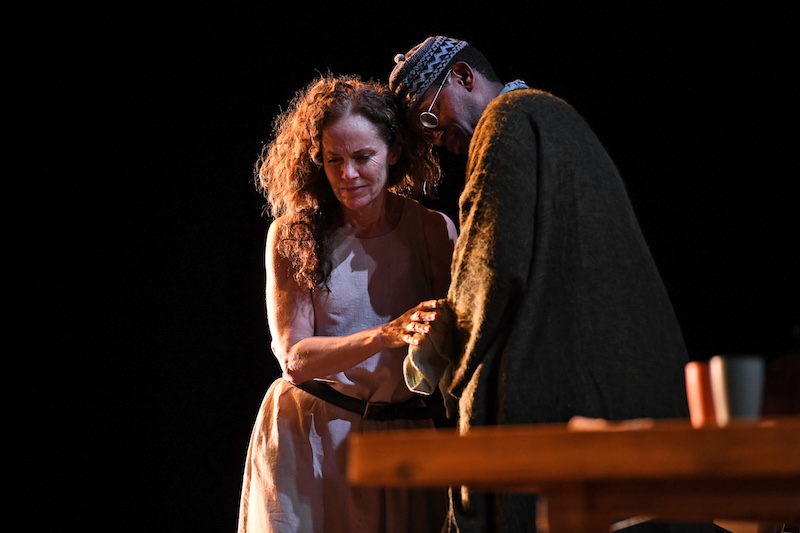
Amy Brenneman and Eric Berryman (Photo by Robert Husky)
Reviewed by Joel Beers
South Coast Repertory
Through May 12
RECOMMENDED
Sure, he’s had a 2,000-year head start on most of the competition, but when it comes to transmedia storytelling, nothing can match the multi-platform reach of Jesus Christ. Films, books, musicals, stained glass windows: whether it’s the greatest every story ever told — or not — may be a subjective call but the story itself is surely the most ubiquitous.
Now, while most versions usually focus on Jesus as sacrificial hero, divine redeemer, compassionate teacher, rebel leader or some combination thereof, rarely do they consider Jesus as a very human brother, son and friend whose life was not lived within the confines of sentences requiring exegesis.
Enter Eleanor Burgess’s Galilee 34, a blisteringly funny and ambitious-as-hell new play receiving its world premiere production at South Coast Repertory.
While a character named Jesus never walks on stage, the presence of someone bearing the Aramaic translation of Yeshua is everywhere, as it is a few months after his crucifixion and the people closest to him have gathered in Nazareth, the small village he grew up near the Sea of Galilee, to continue his ministry. These people include his mother, Miriam/Mary (Amy Brenneman, equal parts world-weary grief and balls of steel), brother Yakov (Eric Berryman, the moral compass,) most trusted disciple Shimon/Peter (Benjamin Pelteson, wonderfully sincere and petty), possible lover, and Miri/Mary Magdalene (Teresa Avia Lim, who makes a sizeable dent in the 2,000 years of silence for her character). (Christopher Cruz, Jeremy Rabb and Sharon Om round out the excellent ensemble).
Yeshua’s crucifixion is one of the few unmistakable parallels Burgess’s story has to the narrative of Jesus’ life, canonized more than a millennium ago by the Catholic Church. Just a couple of divergent details: the Virgin Mary had seven kids, and none of them was courtesy of the Holy Spirit; Yeshua was apparently married to a woman named Hanna and their first child died; no one is really sure if Yeshua rose from the grave or his body just disappeared.
And then there’s the small revision to the official bio of the most influential person in the history of Western civilization: Saul of Tarsus, Paul in the Latin (Raviv Ullman, who is as earnest as he is power-hungry). In this play, Saul’s road-to-Damascus moment doesn’t come three years after Yeshua’s death; he is there just a few months later, and he is the first person to not physically meet Yeshua to believe he is the messiah.
At first, he’s welcomed by the small crew in hopes that his superior knowledge of the Torah might help fix some of the inconsistences in Yeshua’s teaching. But it turns out that he’s a first century Mediterranean Ray Kroc, who sees potential in the mom-and-pop outfit, squeezes everyone else out of the picture, franchises it through selling the notion that Yeshua died for our sins, and then supersizes it with the notion of life after death for those who believe in Yeshua.
Burgess isn’t playing loose with the historical record just because. A history major at Yale and former high school history teacher, she writes on the SCR website that she spent more than a year researching Jewish and Christian theology, the Roman Empire and the Kingdom of Judea, and daily life among the Hellenists. But while history informs the world of the play, it’s evident that Burgess is less interested in writing a historical drama featuring iconic figures than she is in one that is historically accurate in the details but humanizes iconic figures by liberating them from the historical and theological ties that can bind.
That frees her up to make icons real in the flesh by endowing them with genuine personalities and points of view but also with insecurities, doubts, jealousies and pettiness. Those foibles also allow Burgess to demonstrate her sparkling wit, which the outstanding ensemble and deft direction of Davis McCallum amplify.
It all makes for a riotously entertaining ride that still feels earnest and emotionally affecting, largely through the words of Yeshua’s mother. It also strikes a blow against the oppressive silencing of women through the ages by allowing both Marys to tell their own stories.
Galilee 34 is not always the smoothest ride; I’m still trying to make sense of the homeless stranger who basically ignites the entire second act without saying or doing anything more remarkable than revealing that, when he looks at scripture a little sideways, the words all make sense. This is enough for Saul to begin advocating a religion about Yeshua rather than the religion of Yeshua. Still, illogic aside, I’d buy a ticket on any bus driven by someone with the imagination and confidence to envision and pull off an alternative take on this most mainstream of stories.
South Coast Repertory, 655 Town Center Dr., Costa Mesa, Wed.-Fri., 7:45 pm; Sat., 2 pm & 7 pm Sun., 2 pm; thru May 12. www.scr.org. Running time: Two hours and 15 minutes with an intermission














